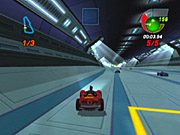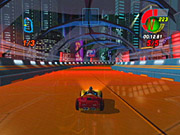Jaleco's new futuristic racing game, Pulse Racer, bears more than a passing resemblance to notable entries in the futuristic racing genre, such as the Wipeout games and Jet Moto. Like these games, Pulse Racer features a multitiered league competition format, an exaggerated physics model, plentiful power-ups, and superpowered vehicles. The key differences between something like Wipeout and Pulse Racer is that Wipeout has a compelling, cohesive look, a great soundtrack, an interesting track design, and fun, responsive controls, while Pulse Racer bears none of these traits.

Let's be even clearer about it: If given the option, you should choose not to play Pulse Racer. But, if you do find yourself playing it, you'll probably spend most of your single-player time in the career mode, where you'll choose a driver and a car and advance through the game's three different leagues. The drivers are divvied up into three different weight classes, while power classes separate the cars, and though this has some minor impact on the track, all the cars feel squirrelly regardless of the driver or car you choose. Along with bad handling, Pulse Racer also suffers from bad collision detection, a thoroughly underwhelming sense of speed, and blatant rubber-band AI--you'll see computer drivers match your speed and performance. In standard futuristic racer fashion, all of the tracks are littered with a variety of familiar defensive and offensive power-ups.
The two most unique mechanics in Pulse Racer are the plasma orbs and the speed-boost system. On certain turns, you'll see a glowing orb floating just outside the track. If you hold down on the appropriate shoulder button before you hit the turn, a bolt of electricity will attach itself to your car and guide you around the turn without any fuss. None of the turns are so outrageously hard that you ever really need to use the plasma orbs, and the fact that the plasma orbs will often fail to activate for no apparent reason means you stand a better chance of winning just driving through the turns on your own. The turbo system plays off the idea in Pulse Racer that the drivers are somehow fused to the cars, and the harder they push the car, the harder it is on their body. You can gain a little extra speed for short bursts by leaning forward on the left analog stick, but the longer you hold it, the faster your heart beats, and eventually your driver will just flatline. Lucky for you, all the cars are apparently equipped with defibrillators, and after a quick jolt, you're back in the race. Your characters don't have any other sort of health gauge, so there's no limit to the number of times you can kill your driver by heart attack in a single race, and it can eventually become pretty morbidly funny.
The gameplay options outside the career mode are pretty thin and include the one-off quick race mode and a time trial mode, as well as multiplayer versions of these modes. One of the rare good ideas in Pulse Racer is the random track generator, though its usefulness is limited by the generally dull designs it produces and by the fact that you have to play through all of the career mode and then some to accumulate enough points to unlock the different variable controls.

The overall aesthetics of Pulse Racer could be described as Wipeout Lite. Everything's shiny and futuristic looking, but there's no depth to the look, and the variety is limited to three basic environments. The cars look sort of like futuristic go-karts, with the majority of your driver's torso sticking out of the cab. The character designs of the drivers are pretty generic, the exception being the driver with tank treads instead of legs, though he still requires a car to participate in the races. Pulse Racer sports a pretty pedestrian design overall, and it's not that technically complex, which makes the pervasive frame rate issues that much more offensive. Virtually every race starts off with at least a couple of seconds of stutter, and it's not uncommon to see the action come to a complete standstill for a beat or two. The icing on the Pulse Racer cake is the weak techno soundtrack and the limited number of sound bytes that each racer is equipped with.
Though Pulse Racer is arguably about as derivative as Quantum Redshift, the other Xbox futuristic racing game, at least Quantum Redshift displays a modicum of technical proficiency and higher production values all around. So in the end, there's really nothing that Pulse Racer does that hasn't been done before and much better. So, to reiterate, do yourself a favor and avoid this cheap-looking, unenjoyable game.